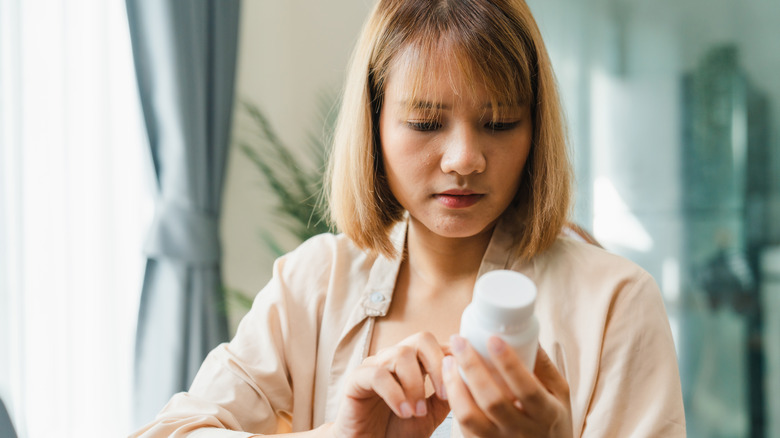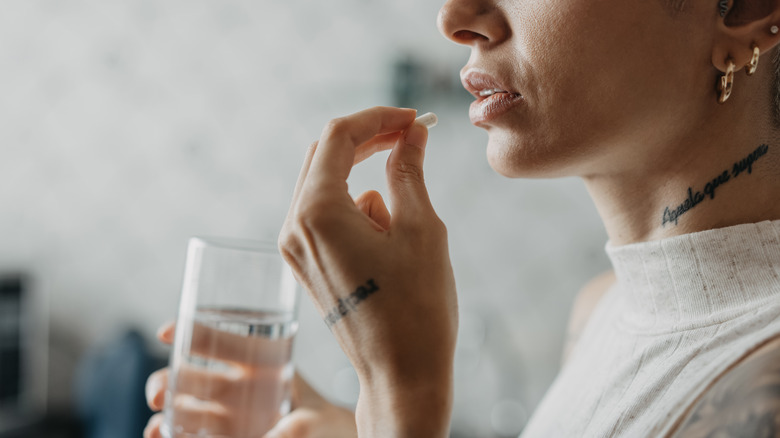Sorry Babe, Your Biotin Supplements May Be Doing More Harm Than Good
From (untrue) vagina myths to TikTok hair goals to generally unrealistic beauty standards, it feels like there's a new reason to take a supplement almost every single day. Hair, skin, and nail supplements have taken the internet by storm, with the National Health and Nutrition Examination Survey showing a noticeable increase in just how many Americans have reported taking them. Biotin and collagen are easily the most popular ingredients in these supplements with pills, powders, gummies, capsules, and even dust all being marketed as ways to make you more beautiful. However, despite the popularity of these supplements, doctors don't necessarily agree you should be taking them.
Women between the ages of 20-39 are the most likely to be taking hair, skin, and nail supplements. However, there is almost no data to support the need for them. In fact, new (and concerning) research published in the Journal of the American Academy of Dermatology (JAAD) has actually prompted the U.S. Food and Drug Administration (FDA) to issue a warning about their use. From a lack of regulatory oversight on supplement production to the high prevalence of overdosing, it might be time to rethink your beauty supplement routine. Let's explore the problems with hair, skin, and nail supplements and why the wellness industry might not be your friend.
Why is everyone taking supplements?
First, why is everyone so obsessed with taking supplements? Chances are you've seen the words "glow" and "beauty" on some or all of the marketing for hair, skin, and nail supplements, even though there is absolutely no definitive way to measure either as a result of a product. With promises like curing your acne, stopping and reversing hair loss, and making you look younger, these supplements prey on the unrealistic beauty standards fed to (predominately) women and femme folks on a daily basis. In this way, it's no wonder that women make up the largest demographic taking these supplements and why they are the most at risk for the predatory marketing of these cure-alls.
Dr. Rebecca Hartman, one of the co-authors of the JAAD research and an assistant professor of dermatology at Harvard Medical School, told Today, "People want to look their best, feel their best and present their best self to the world, so they're interested if there's a quick fix or a supplement that can help them." While our society clearly values beauty and many of us can relate to wanting to keep up with beauty trends, Dr. Hartman elaborated, "From my perspective, the risks outweigh the benefit in that there's not a lot of great evidence for [supplements]."
Biotin and collagen
The vast majority of hair, skin, and nail supplements promote biotin and/or collagen as their primary ingredients. B7, more commonly known as biotin is big business in the beauty industry. However, the daily recommended dose is generally taken care of through a normal diet (it's found in egg yolks, milk, nuts, and grains). Also worth noting is that it's pretty uncommon for someone to experience a biotin deficiency, so most biotin supplements include doses far higher than the human body needs, and this can be dangerous, "It can give a false appearance of hyperthyroidism by making it look like your thyroid is overacting," Dr. Hartman explained before also emphasizing that excessive biotin can also interfere with cardiac tests. The FDA noted that many end up consuming 650 times the recommended amount of Biotin, by companies recommending you take multiple supplements a day.
The protein collagen is found in bones, muscles, skin, and tendons. As we age our body's collagen production drops which results in wrinkles, stiffness in joints, and muscle weakness. For these reasons, people look to collagen supplements as a way to combat aging. In 2022, the global collagen market was $9.12 billion, with revenue forecasted to hit $19.9 billion in 2030. However, most commercial collagen is made using animal byproducts (skin, tendons, scales, bones, cartilage, connective tissues) from farm animals like cows, chickens, pigs, and even fish. These byproducts are collected after these animals have been processed for their meat and can lead to cross-contamination and allergy concerns.
Downsides of supplements
Dietary supplements don't require FDA approval. Worse, because approval isn't needed there is no safety testing required prior to a supplement being sold to the public. Dietary supplements are instead regulated as food, so "they have no endorsement from the FDA in terms of safety and effectiveness, and I think that's the biggest issue," Dr. Hartman told Today. This lack of oversight can lead to other, far more dangerous, ingredients being included in your supplements. A 2020 study of 28 top-selling brands of collagen supplements found arsenic, lead, mercury, and cadmium — all toxic heavy metals. Even low levels of these heavy metals can lead to serious health risks like organ damage, with some even classified as known or probable carcinogens. This means that it's increasingly not enough to simply wonder if your supplements are working, you have to also worry about if your supplements are actually hurting you.
Another important thing to remember about the onslaught of supplement marketing is that it's an incredibly profitable business for wellness companies. The global beauty supplement market is expected to reach $7 billion by 2024, so it's ultimately in wellness companies' best interests to keep the hair, skin, and nail supplement trend going, even if it's detrimental to people's health. As always, it is best to talk with your doctor before deciding to take any supplements.



